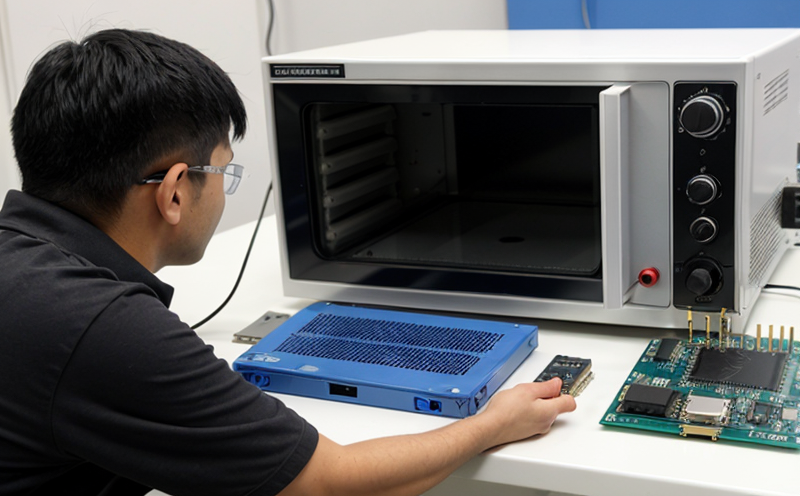IEEE 1681 Reliability Qualification Testing for Microelectronic Devices
The IEEE Standard 1681, "Reliability Qualification Test Methods for Electronic Components," is a vital tool in the semiconductor industry. This standard establishes methods to evaluate and qualify microelectronic devices based on their reliability under various environmental conditions. The IEEE 1681 test suite includes stress tests such as thermal cycling, humidity conditioning, and bias testing.
The importance of this service cannot be overstated, especially for manufacturers aiming to ensure the longevity and performance stability of their products in harsh environments. These devices are often used in critical applications where failures could lead to significant economic losses or even safety risks.
Our laboratory adheres strictly to IEEE 1681 guidelines, ensuring that all tests are conducted under controlled conditions to accurately reflect real-world scenarios. This approach guarantees that the reliability data generated is both reproducible and credible, providing manufacturers with valuable insights into how their products will perform in actual use.
The testing process involves a series of carefully designed experiments aimed at simulating the stressors these devices may encounter throughout their lifecycle. For instance, thermal cycling tests expose components to extreme temperature variations repeatedly over time, while humidity conditioning assesses device performance under high moisture conditions which are common in many industrial settings.
Bias testing is another critical aspect that evaluates how well a component functions when subjected to electrical stresses beyond nominal operating parameters. By conducting these rigorous tests, we can identify potential weaknesses early on and recommend necessary improvements before the product reaches market readiness.
Our team of experienced engineers uses state-of-the-art equipment tailored specifically for microelectronics testing, ensuring accurate results every time. We also employ advanced data analysis techniques to interpret test outcomes effectively, providing clients with comprehensive reports that highlight both strengths and areas requiring improvement.
Adhering strictly to IEEE 1681 ensures compliance with industry best practices while delivering reliable performance data that supports informed decision-making throughout the product development cycle.
Applied Standards
| Standard Name | Description |
|---|---|
| IEEE 1681 - Reliability Qualification Test Methods for Electronic Components | This standard defines a suite of tests designed to evaluate the reliability of electronic components under various environmental stresses. |
| JEDEC JSR-375 (MIL-HDBK-217F) | A companion document that provides detailed failure rate data for electronic devices, used alongside IEEE 1681 to provide a comprehensive reliability assessment. |
Scope and Methodology
| Test Type | Description |
|---|---|
| Thermal Cycling Test | This test simulates the effect of repeated temperature changes on a device, which is typical in aerospace, automotive, and industrial applications. |
| Bias Testing | Involves applying electrical stress above normal operating levels to assess durability and stability. |
| Humidity Conditioning Test | Evaluates how a device performs under conditions of high humidity, relevant for coastal or humid climates. |
The scope includes all microelectronic devices intended for use in severe environmental conditions. The methodology encompasses not just the application of these tests but also thorough data analysis to ensure accurate interpretation and reporting of results.
Our approach begins with initial consultation with clients to understand specific requirements regarding test parameters, specimen preparation, and expected outcomes. Once agreed upon, we proceed with detailed testing following strict adherence to IEEE 1681 standards.
Data collected during the tests is analyzed using sophisticated software tools that provide insightful metrics about device performance. The final report includes not only raw data but also interpretations based on industry benchmarks like JSR-375 and MIL-HDBK-217F, giving clients a clear picture of their product's reliability.
Benefits
The IEEE 1681 Reliability Qualification Testing service offers numerous advantages to our clients. Firstly, it provides peace of mind knowing that your products have been tested rigorously against industry standards, thereby enhancing brand reputation and customer trust.
Secondly, by identifying potential issues early in the development process, this testing helps reduce costs associated with product recalls or premature failures once released into the market.
Thirdly, compliance with these tests ensures that your products meet regulatory requirements, opening up new markets for international distribution without facing additional barriers due to non-compliance.
Furthermore, reliable data from such extensive testing enables better informed design decisions leading to more robust and efficient products. This ultimately translates into improved product quality and extended product life cycle, benefiting both manufacturers and end-users alike.
Lastly, our comprehensive reports serve as valuable resources for continuous improvement initiatives within organizations, driving innovation forward by pinpointing areas needing enhancement.





